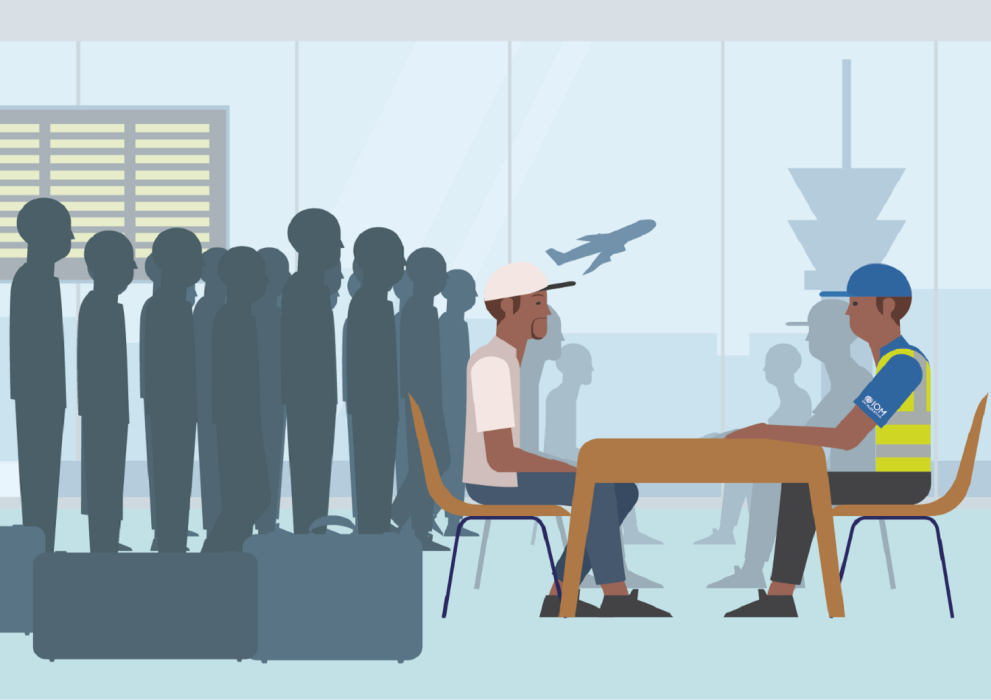
“Welcome bro! Great to have you back! I trust you had a good flight?”
This is how I welcomed Kojo at Kotoka International Airport, in Accra on 27 July 2017. Kojo, 24, had just returned to Ghana from Libya, on a charter flight organized by the International Organization for Migration (IOM). He looked exhausted, lost. But there was also a sparkle of relief in his eyes.
I work as a project officer for IOM in Ghana. Soon after meeting Kojo, we sat down together and started the registration process. I asked him a series of questions: where he came from, what was he doing before he left Ghana, and whether he had family members that we should contact. Then I gave him the small amount of pocket money he was entitled to receive. A smile stretched across his face.
“I am happy to be back. I feel a bit disappointed, but I’m alive and that is the most important thing after all,” Kojo said.
Our conversation went on for a little while longer, but 137 other people had arrived on the same charter flight — the first organized by IOM between Libya and Ghana. I knew that registration and screenings would keep IOM staff awake through the night, so Kojo and I agreed to talk again as soon as possible.
A few days later, we met at the IOM premises in Accra to resume our discussion. Kojo, like most of the young Ghanaians we welcomed home that night in July 2017, is young and able-bodied — full of energy and the best intentions for his family. He comes from the Brong Ahafo Region in Ghana’s countryside, where the youth feel trapped by a lack of sustainable economic opportunities. For Kojo, poverty has been passed down through several generations and his hopes for change and a better future for his family have long been lost.
It took Kojo nearly a year to raise USD 500, what he considered a “sufficient amount” before his departure to Libya in 2015. He raised the amount from working his maize farm, with support from his sister and brother in-law who hoped, to get some money back when Kojo made it to Europe — even if it would take decades.
Remittances, especially those received in regular instalments, can represent both a source of income and a safety net for families back home in Ghana. The thought that another family member could be helped to travel abroad by a relative who made it is also a motivating factor for some. As such, families do not question collective support for migration.
Kojo’s original destination was not Libya but Germany, where his friend lives. “I would have preferred to use legal means. But it’s quite difficult to enter Europe. I was told that the only way we can only get in is through irregular means,” Kojo explained.
“It was a daring move I made,” he continued. “I had heard a lot about the dangers people face — some lose their lives. But I was not deterred. I was determined to get to Europe so I [could] take care of my family. I wish I had received proper advice because though I dared, I gave up in the middle of the desert. I [regret] that.”
Before he left, Kojo had many aspirations, including training to be a software engineer; but he couldn’t achieve this because he couldn’t afford it. Now, he wants to salvage that dream.
“After acquiring a certificate in electronics, I enrolled in a Highest National Diploma [programme] to upgrade myself,” said Kojo, describing his education before he decided to leave Ghana. “I had to drop out for financial reasons. I wanted to become an engineer. If things had gone as planned, I would have pursued that goal. But all is not lost — I have returned with a lot of brilliant ideas that I can implement.”
Kojo has battled stigmatization and marginalization from both his friends and close relatives since coming back to Ghana. But he doesn’t see himself as a failure. He believes that he will achieve the new goals he has set for himself.
“My family has not been supportive ever since I came. They see me as a failure, but I refuse to be labelled as such. I have a strong willpower to succeed. I am not thinking about migration again. I am thinking about success — I am motivated to succeed,” he added.
Kojo is currently receiving support to set up an electrical shop through the EU-IOM Joint Initiative. This, he believes, will help him with the necessary funds from savings to further his education and to pursue his career goals.
Source: IOM
Details
- Publication date
- 12 May 2019
- Region and Country
- Ghana
- Thematic
- Improved migration management
- Partner
- International Organization for Migration
